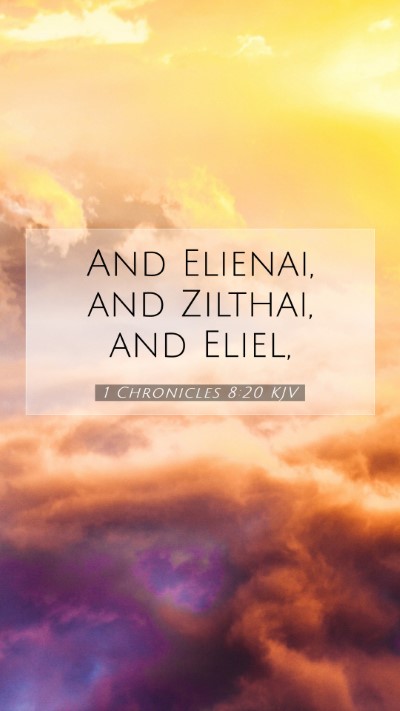Understanding 1 Chronicles 8:20
The verse 1 Chronicles 8:20 states:
"And Abitub begat Ahitub, and Ahitub begat Ahimelech." (1 Chronicles 8:20, KJV)
Meaning of 1 Chronicles 8:20
This verse is part of a genealogical record in the Old Testament, which serves to establish lineage and connections among the tribes of Israel. Understanding this verse within its context provides insight into the historical and spiritual significance of the family lines in the Israelite community.
Bible Verse Interpretations
- Matthew Henry: Henry emphasizes the importance of genealogies in Scripture to demonstrate God's faithfulness through generations. The mention of Abitub and his descendants highlights the continuity of God's promise and provision through familial lines.
- Albert Barnes: Barnes explains that the records of genealogies were crucial for various reasons, including establishing the priestly lineage. Here, he notes that Ahimelech, a descendant referenced later in 1 Samuel, plays a significant role in the priestly responsibilities and is a connector to David's narrative.
- Adam Clarke: Clarke discusses the significance of each name mentioned in genealogy, stressing the accuracy required in preserving these records. He views genealogies not as mere lists but as testimonies to God's unbroken promise to Israel through its leaders and priests.
Scripture Analysis
This verse contributes to the broader theme found throughout the Chronicles, which often calls attention to the priests and Levites' roles. Genealogies reinforce the legitimacy and authority of these figures, linking them to their roles in worship and service to God.
Key Themes in 1 Chronicles 8:20
- Historical Significance: The genealogical lists preserve the history of Israel, showing the continuity of leadership.
- Spiritual Legacy: Each generation builds upon the last, highlighting the importance of spiritual inheritance and faithfulness over time.
- Identity and Belonging: Genealogies provide the people with a sense of identity, reminding them of their heritage as the chosen people of God.
In-Depth Bible Verse Analysis
To fully appreciate 1 Chronicles 8:20, one must consider its place amidst the genealogical records in the surrounding chapters, especially how they relate to the leaders and priests important in later narratives, particularly concerning David and his reign. Each name brings to life the stories and events documented throughout the Old Testament.
Applying Bible Verses to Daily Life
While this verse appears straightforward, its true significance lies in our understanding of how God works through families and generations. It encourages believers to reflect on their own spiritual heritage and the responsibility they have to pass down their faith.
Cross References
- 1 Samuel 21:1-9 - Describes Ahimelech's role in aiding David.
- Exodus 28:1 - Discusses the priestly lineage.
- 1 Chronicles 9:11 - Further details the descendants of Ahimelech and their importance.
Bible Study Insights
For those engaged in Bible study groups or online Bible study, exploring genealogies like that in 1 Chronicles 8:20 can refine your understanding of Israel's history and God's promises. Consider how genealogies serve not only as historical records but also as profound theological reflections on God's faithfulness.
Conclusion
In summary, 1 Chronicles 8:20 serves as an essential part of the larger narrative of Israel's history, connecting generations and illustrating God’s unending faithfulness. Understanding this verse enriches one's comprehension of biblical history and the importance of lineage in God's plan. These insights, derived from biblical commentaries, can engender deeper Bible verse explanations and a richer appreciation for meaning of Bible verses.


